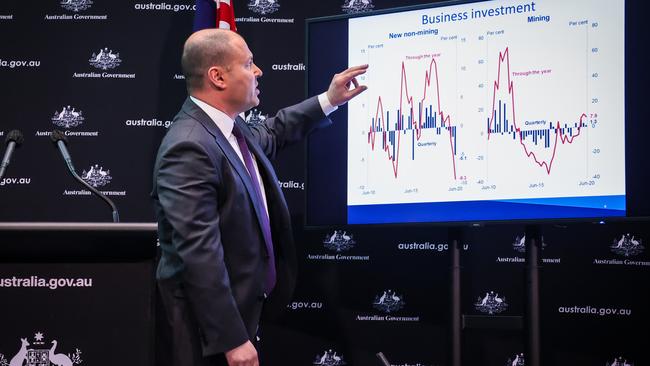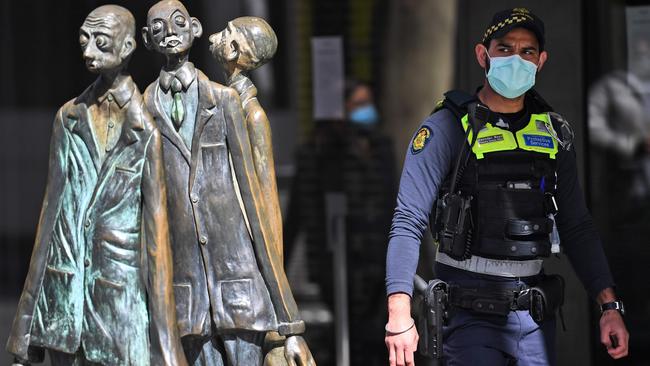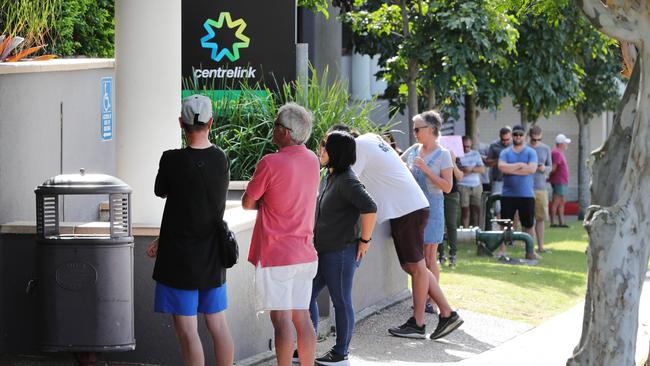Young people are the biggest losers hit by the Australia recession
We’re officially in the grip of the worst economic downturn since World War II. And one group will pay for the crisis for decades to come.

Economy
Don't miss out on the headlines from Economy. Followed categories will be added to My News.
Australia is facing an economic bloodbath as we reel from the worst contraction since the Great Depression – but there’s one group that will bear the brunt of the pain.
On Wednesday, it was confirmed the coronavirus crisis had pushed Australia’s finances into the biggest quarterly fall on record and the steepest annual plunge since the end of World War II, with the economy contracting by a staggering seven per cent through the quarter.
Prime Minister Scott Morrison said the economic figures represented a “heartbreaking” day for the nation, while a sombre Josh Frydenberg said the road ahead would be “long, hard and bumpy”.
In other words, we’re in for a world of pain the like of which we’ve not seen for decades – but not all Aussies would be affected equally.
Deloitte Access Economics partner Chris Richardson said while the impact of a recession on different groups tended to change over time, it was women and young people who were immediately hardest hit.
RELATED: Follow our live coronavirus coverage

“With lockdowns, the pain was felt in jobs that were lost in cafes, restaurants, pubs and clubs, hotels and motels, airlines and airports and stuff connected to tourism – some of the upfront data showed women and young people in their 20s were affected by relatively more job losses which reflected where they work, although that is evening up now somewhat,” he said.
“But as lockdowns ease you start to get that traditional economic pain we’re already starting to see – we’re starting to get pain in manufacturing, construction and areas that typically look sick in a recession.
“But we know from past recessions in Australia and elsewhere in the world that the biggest price is paid by the young – those coming out of school and higher education and hitting the job market at exactly the wrong time.”
Mr Richardson explained those who had not yet “found their feet” and established themselves in their career would likely feel the pinch for years to come.
“We know those effects are evident for decades after because they start out on the wrong foot, which means they’re always a step behind compared to those who are just a handful of years ahead of them but who have a better foothold in the job market,” he said, noting the federal and state governments were aware of the problem and would be investigating ways to alleviate the pressure.
“The war of 2020 has been a war for our health and the biggest beneficiaries have been mostly older Australians.
RELATED: How much you’ll save from tax cuts

“The next war will be for jobs and the extent we win or lose that fight will be very important for younger Australians.”
It was a sentiment echoed by AMP chief economist Shane Oliver, who told news.com.au recessions traditionally affected young people more harshly than other demographics.
“It makes it more difficult to get into the workforce because obviously there are fewer jobs around, and even when you do get in, particularly in white collar jobs, a lot of people are working from home now so that guidance you would usually get isn’t there,” he said.
“The uncertainty makes it harder for young people to start their careers and the environment once they do will be more challenging.”
Dr Oliver said the career turmoil could “absolutely last years” as young people struggled to break into a highly competitive job market, and then faced lower wages, fewer opportunities for promotion and less support form more experienced colleagues than they would in more prosperous times.
SILVER LINING
However, it’s not all doom and gloom.
While Mr Richardson said there was a “risk of generational scarring” regarding unemployment, surprisingly, the coronavirus-fuelled budget blowout was less of a problem for the nation and young people in particular than many assumed.
While many Australians assume the budget has been destroyed and that young Aussies will therefore be hit with a “lifetime of higher taxes” and lower spending, Mr Richardson said that was largely a “phantom menace”.
While it’s true we’ve been “spending a fortune” to defend ourselves from the virus, he said Australia’s falling interest rates would help to soften the blow.
“Although debt has jumped a lot, interest rates have fallen by even more, and if you look at the ongoing costs of what we’re doing, it’s a tiny fraction of what many suspect it is,” he said.
He said interest repayments were a smaller share of the economy than in recent years and were actually decreasing along with falling interest rates, and while debt had gone up, it cost less than it had previously.
As a result, he said we could push debt to the side for now and let the economy start to recover first.
“That’s easier to do in Australia than the rest of the rich world … because we had our budget back in balance before this hit, so Australia actually had much lower government debt as a share of national income than pretty much everyone,” he said.
RELATED: Big losers in $1500 pandemic leave plan

“Our budget was fighting fit compared to everyone else as we went into this, and although our debt has jumped, it’s still a fraction of the debt of lots of other countries.”
Therefore, Mr Richardson said it was unlikely the government would look to slash welfare or raise taxes anytime soon.
He said one of the strengths of Australia’s virus response was quickly doubling the unemployment benefit, which was a “last safety net” for those feeling the pinch.
“Giving that certainty to Mr and Mrs Australia is a very valuable thing,” he said.
“A sicker economy hurts a whole bunch of things, and one effect has been the remarkable collapse of interest rates which is helping house prices.
“It means they will grind down for a while and so they should, because house prices were pretty silly.”
He said while there wasn’t exactly a house price “revolution” going on, more and more first home buyers were now able to muscle in.
Originally published as Young people are the biggest losers hit by the Australia recession

